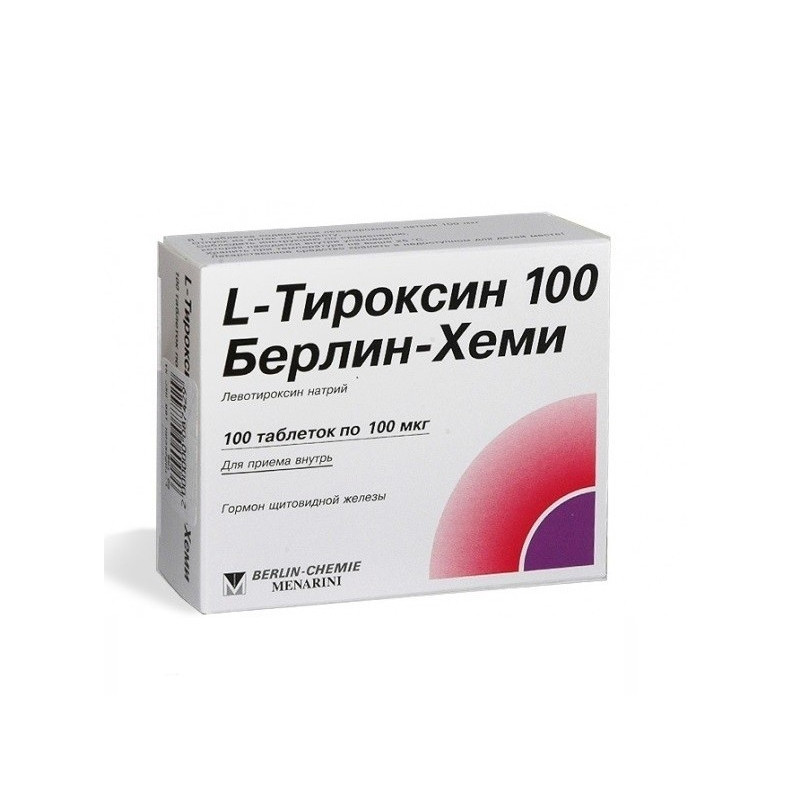



 All payments are encrypted via SSL
All payments are encrypted via SSL
 Full Refund if you haven't received your order
Full Refund if you haven't received your order
Pills
1 pill contains levothyroxine sodium 100 mcg.
100 pieces.
L-thyroxine is a preparation of thyroid hormones. Synthetic levorotatory isomer of thyroxine. In small doses, L-thyroxine has an anabolic effect. In medium doses, it stimulates growth and development, increases the tissue's need for oxygen, stimulates the metabolism of proteins, fats and carbohydrates, and stimulates the activity of the cardiovascular system and the central nervous system. In high doses, inhibits the production of TTRG of the hypothalamus and TSH of the pituitary gland.
Primary and secondary hypothyroidism; mixed goiter; complex treatment of toxic goiter and autoimmune thyroiditis, euthyroid hyperplasia of the thyroid gland; prevention of recurrence after surgical treatment of nodular and malignant tumors of the thyroid gland; cretinism.
Differential diagnostic test for thyroid suppression.
Hyperfunction of the thyroid gland of various origins, acute myocardial infarction, untreated adrenal cortex insufficiency, hypersensitivity to levothyroxine sodium.
In pregnancy and lactation, L-thyroxin should be used under the supervision of a physician.Use in combination with thyreostatics during pregnancy is contraindicated due to an increased risk of hypothyroidism in the fetus.
Dosing regimen set individually depending on the evidence. Apply L-thyroxine in a dose of 12.5-200 mcg 1 time / day for 20-30 minutes before meals.
Symptoms of hyperthyroidism: possible (when used in high doses, including when the dose is too rapid at the beginning of the course of treatment) tachycardia, palpitation, arrhythmias, strokes, headache, nervousness, tremor, sleep disturbances, anxiety, muscular weakness and cramps, weight loss, diarrhea, menstrual disorders, vomiting.
With extreme caution, L-Thyroxine is used in patients with cardiovascular diseases (including IHD, heart failure, arterial hypertension). In such cases, levothyroxine sodium should be used at a low initial dose, increasing it slowly and at large intervals.
Levothyroxine may enhance the effect of coumarin derivatives and weaken the effect of hypoglycemic agents. Kolestiramine slows down the absorption of levothyroxine, so the interval between taking colestyramine and levothyroxine should be 4-5 hours. Rapid IV administration of phenytoin can lead to an increase in plasma concentration of free levothyroxine, as well as lyothyronine.Salicylates, dicumarol, Furosemide in high doses (250 mg) enhance the action of levothyroxine, because able to displace it from the sites of binding to plasma proteins.
Symptoms characteristic of thyrotoxicosis: palpitations, heart rhythm disturbances, heart pain, anxiety, tremor, sleep disturbances, excessive sweating, loss of appetite, weight loss, diarrhea.
Treatment: it may be recommended to reduce the daily dose of the drug, a break in treatment for several days, the appointment of beta-blockers. After the disappearance of side effects, treatment should begin with caution with a lower dose.
Store at a temperature not higher than 25 ° С. Keep out of reach of children. Do not use after expiration date.
